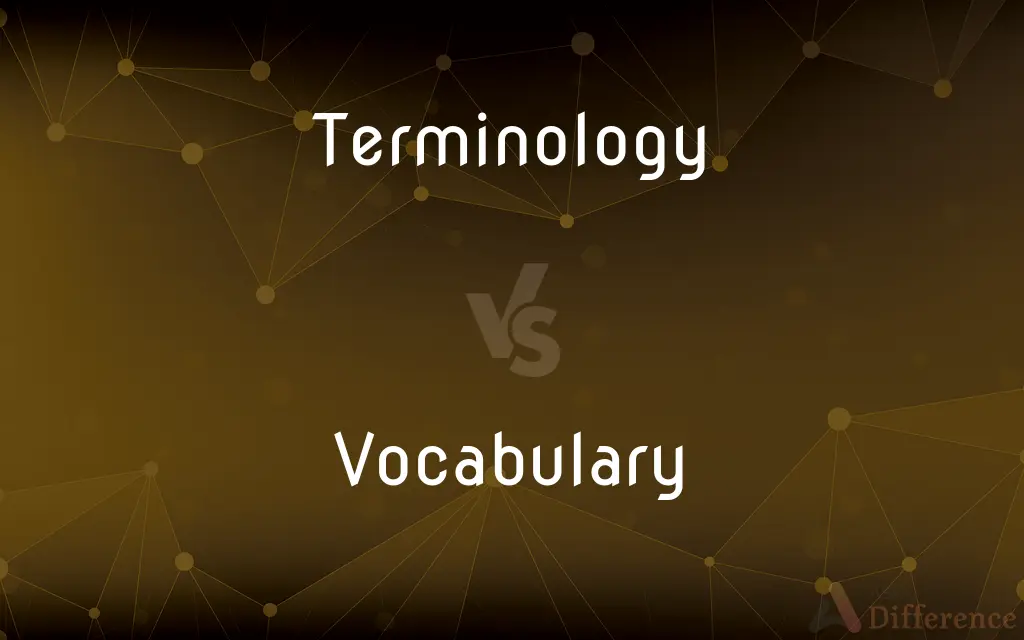Terminology vs. Vocabulary — What's the Difference?
Edited by Tayyaba Rehman — By Maham Liaqat — Updated on February 27, 2024
Terminology refers to a set of terms and expressions specific to a particular field or subject, emphasizing precision and technicality, while vocabulary encompasses all words known and used by a person or within a language, broader and more general.

Difference Between Terminology and Vocabulary
Table of Contents
ADVERTISEMENT
Key Differences
Terminology is the collection of terms that are associated with a specific domain of knowledge, such as medical terminology or legal terminology. These terms are used for precise communication within that field, often embodying specific meanings not found in everyday language. Vocabulary, on the other hand, includes all the words a person knows or uses, as well as the total set of words within a language. It spans from common, everyday words to more complex and specialized terms.
The development and use of a specialized terminology facilitate clear and effective exchange of information among experts. Vocabulary development is a fundamental aspect of language learning, influencing one's ability to communicate, understand, and express ideas effectively.
Terminology is about specificity and is confined to a particular subject area, vocabulary is about breadth and depth of language knowledge. For instance, a scientist might use specific terminology in a research paper to ensure accuracy and clarity, but their vocabulary would include a much wider range of words used in various contexts.
The study of terminology (terminology science) involves understanding the concepts behind terms, how terms are created and organized, and how they relate to each other within a specialized field. Vocabulary acquisition, however, is a broader educational goal encompassing reading, writing, and oral communication skills.
Both terminology and vocabulary are essential for effective communication, but they serve different purposes. Terminology ensures precision in professional and academic contexts, while a rich vocabulary enhances overall language proficiency and the ability to engage in diverse conversations.
ADVERTISEMENT
Comparison Chart
Definition
Set of terms specific to a particular field or subject.
All words known or used by a person or within a language.
Purpose
Ensures precise communication within a specific domain.
Facilitates general understanding and expression.
Scope
Narrow, focused on a specific area of knowledge.
Broad, encompassing all areas of language.
Usage Context
Professional, academic, technical fields.
Everyday communication, education, media.
Study Focus
Understanding and organizing terms within a field.
Expanding the range of words known or used.
Compare with Definitions
Terminology
Scientific terminology encompasses terms like "photosynthesis" and "nucleotide".
Research papers are written using precise scientific terminology.
Vocabulary
Basic vocabulary includes words like "house," "run," and "happy".
Children's books use simple vocabulary to promote language learning.
Terminology
Legal terminology includes terms such as "tort" and "indemnity".
Attorneys must understand legal terminology to practice effectively.
Vocabulary
Specialized vocabulary can include technical terms but is broader than strict terminology.
A chef's vocabulary includes cooking techniques and ingredients.
Terminology
Business terminology includes terms like "ROI" (Return on Investment) and "market capitalization".
Analysts assess companies using specialized business terminology.
Vocabulary
Everyday vocabulary encompasses words used in daily communication.
Everyday vocabulary is essential for shopping, traveling, and socializing.
Terminology
Medical terminology involves terms like "tachycardia" and "hematoma".
Doctors use medical terminology to describe patient conditions accurately.
Vocabulary
Expressive vocabulary allows for creative and varied expression.
Authors use a rich vocabulary to create vivid imagery and emotions.
Terminology
Technical terminology in computing contains terms like "algorithm" and "bit".
Programmers communicate issues using specific technical terminology.
Vocabulary
Advanced vocabulary might include words like "antithesis," "cogent," and "ubiquitous".
Advanced vocabulary is often found in academic texts.
Terminology
The vocabulary of technical terms used in a particular field, subject, science, or art; nomenclature.
Vocabulary
A vocabulary is a set of familiar words within a person's language. A vocabulary, usually developed with age, serves as a useful and fundamental tool for communication and acquiring knowledge.
Terminology
Terminology is a general word for the group of specialized words or meanings relating to a particular field, and also the study of such terms and their use. This is also known as terminology science.
Vocabulary
All the words of a language.
Terminology
The set of terms actually used in any business, art, science, or the like; nomenclature; technical terms.
Vocabulary
The sum of words used by, understood by, or at the command of a particular person or group.
Terminology
The terms actually used in any business, art, science, or the like; nomenclature; technical terms; as, the terminology of chemistry.
The barbarous effect produced by a German structure of sentence, and a terminology altogether new.
Vocabulary
A list of words and often phrases, usually arranged alphabetically and defined or translated; a lexicon or glossary.
Vocabulary
A usually alphabetized and explained collection of words e.g. of a particular field, or prepared for a specific purpose, often for learning.
Vocabulary
The collection of words a person knows and uses.
My Russian vocabulary is very limited.
Vocabulary
A list or collection of words arranged in alphabetical order and explained; a dictionary or lexicon, either of a whole language, a single work or author, a branch of science, or the like; a word-book.
Vocabulary
A listing of the words used in some enterprise
Vocabulary
A language user's knowledge of words
Common Curiosities
Why is understanding terminology important in professional fields?
It ensures accurate and efficient communication among experts, crucial for collaboration and understanding.
Can terminology be part of one's vocabulary?
Yes, if a person is knowledgeable in a specific field, the terminology of that field becomes part of their vocabulary.
Is specialized vocabulary the same as terminology?
Specialized vocabulary is broader and may include terminology, but it also encompasses other relevant words not strictly defined as terminology.
What's the main difference between terminology and vocabulary?
Terminology is specific to a particular field for precision, while vocabulary is the broader set of words known or used by an individual or within a language.
How does one expand their vocabulary effectively?
Through reading, conversation, and study, focusing on a variety of sources and subjects.
What role does technology play in vocabulary and terminology expansion?
Technology not only introduces new terms but also facilitates access to vast amounts of information for learning and language acquisition.
How do children develop vocabulary and terminology?
Through education, reading, and increasingly specialized studies as they grow older and enter specific fields of interest or study.
What strategies can help with learning complex terminology?
Mnemonics, context usage, and regular exposure to the field's literature can aid in learning complex terminology.
Is it possible for terminology to become outdated?
Yes, as fields evolve, new discoveries are made, and terms may be replaced or fall out of use.
How does one's vocabulary reflect their knowledge or intelligence?
A rich vocabulary can indicate a broad range of knowledge and the ability to articulate thoughts precisely and effectively.
Can a common word become terminology?
Yes, if a common word acquires a specific meaning in a professional or technical context, it can be considered part of that field's terminology.
How does bilingualism affect vocabulary and terminology understanding?
Bilingual individuals may have a broader overall vocabulary and can understand or translate terminology across languages, enriching their communicative abilities.
Do languages influence how terminology is developed?
Yes, cultural and linguistic backgrounds can influence the creation and adoption of terms within a field.
How important is context in understanding vocabulary and terminology?
Context is crucial, as it helps clarify the meanings of words and terms, especially in specialized fields.
Why might someone struggle with learning new terminology?
Complexity, lack of familiarity with the field, or learning challenges can hinder terminology acquisition.
Share Your Discovery

Previous Comparison
Hail vs. Hell
Next Comparison
Junior vs. YoungAuthor Spotlight
Written by
Maham LiaqatEdited by
Tayyaba RehmanTayyaba Rehman is a distinguished writer, currently serving as a primary contributor to askdifference.com. As a researcher in semantics and etymology, Tayyaba's passion for the complexity of languages and their distinctions has found a perfect home on the platform. Tayyaba delves into the intricacies of language, distinguishing between commonly confused words and phrases, thereby providing clarity for readers worldwide.















































